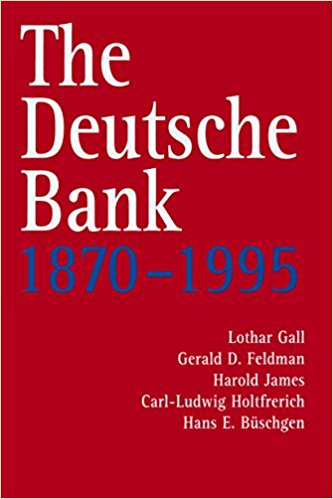Background
Lothar Gall was born on December 3, 1936, in Loetzen, Poland.








(This work tells the story of the rise to fortune of one o...)
This work tells the story of the rise to fortune of one of the world's largest banks - from its foundations on 1870 and the early years, to the great expansion before World War I, the difficult war years, the great inflation and the tenuous stabilization of the late 1920s, the great Depression and banking crisis of the early 30s, the effects of Nazi rule and a new world war, through to a key role in the great achievements and growth of postwar Germany and the bank's rise to a global provider of financial services.
http://www.amazon.com/gp/product/0297816063/?tag=2022091-20
1995
Lothar Gall was born on December 3, 1936, in Loetzen, Poland.
Gall attended Universities of Mainz and Munich and earned Doctor of Philosophy in 1960. He graduated from University of Cologne in 1967.
Gall began his career as a faculty member of the University of Giessen during 1968 year. After that he held the same position at the Free University of Berlin during 1969. He was a guest professor at the Oxford University from 1972 to 1973. He worked as a professor of history at Goethe University Frankfurt from 1975 until his retirement in 2005.
Among his most known books was a regional study of liberalism in Baden between 1848 and 1871. This informed an influential 1975 article about the effects of the 1848 revolution upon German liberalism. His biography of Otto von Bismarck has been translated into English.
Gall has made a great contribution to the educational process as a history teacher.
His books, science works and articles are widely known, they influence the science of History.
He got Gottfried Wilhelm Leipniz- Preis from Deutsche Forschungsgemeinschaft in 1987.
Gall also won Herbert Quandt Medienpreis in1990.
He received Global Business Book Award in 1996, for Die Deutsche Bank.
(This work tells the story of the rise to fortune of one o...)
1995Gall argued that the revolution transformed liberalism from a constitutional movement committed to a classless society of burghers to an economically bourgeois ideology committed to free-market capitalism.
Gall was a vice president of Deutsche Forschungsgemeinschaft. He was a member of board of directors of the Society for Business History. He was a member of Bayerische Akademie der Wissenschaften, as well as a member of Bayerische Akademy Wissenschaften, Historische Kommission bei de Bayerischen Akademy des Wissenschaften, Kommission für die Geschichte des Parlamentarismus und despolitischen Parteien, Committee for German History in Berlin.
Gall married Claudia Eder on July 4, 1973. The couple have 2 children: Franziska and Tobias.
